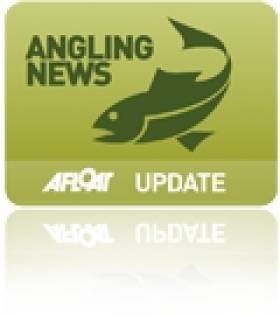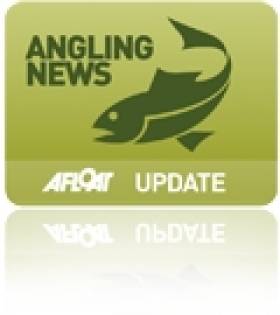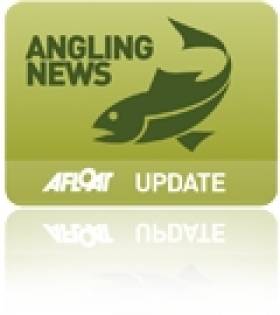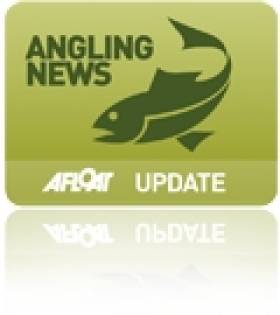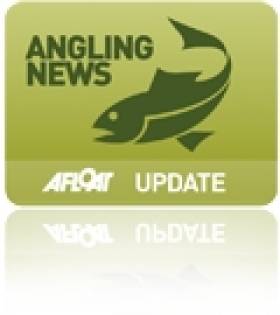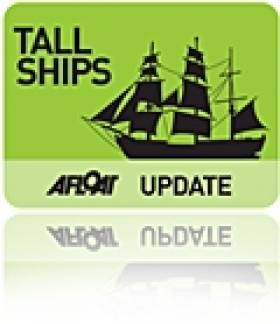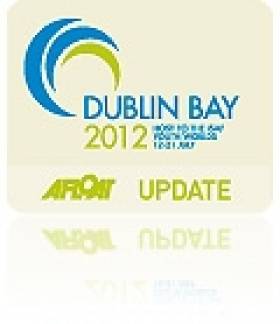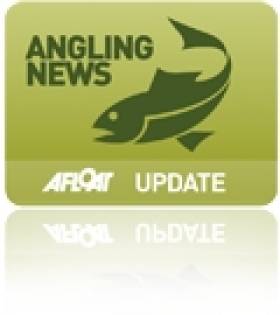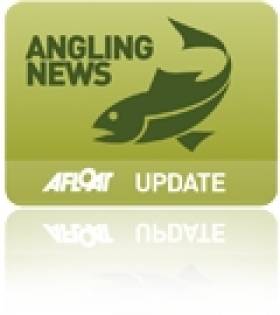Displaying items by tag: 2012
Special Angling Event Produces First Salmon of 2012
#ANGLING - The first wild Atlantic spring salmon of 2012 was caught Sunday on the River Liffey in exceptional circumstances, The Irish Times reports.
Though the river is closed for salmon fishing as stocks are currently below sustainable levels, Inland Fisheries Ireland sanctioned a special catch-and-release club event for survey reasons at Islandbridge in the capital.
Declan Briggs – a 47-year veteran of the Dublin and District Salmon Anglers' Association - landed the 8.5lb beauty using a wooden Devon lure at 9.50am.
“This is my first time to catch the first fish. I’m absolutely delighted," he said.
Elsewhere in Ireland, Briggs' catch was mirrored by Tyrone man Ian Martin, who caught the northern region's first salmon on the year on the River Drownes near Bundoran.
The Irish Times has more on the story HERE.
IFI Launches 2012 Sponsorship Programme
#ANGLING - Inland Fisheries Ireland (IFI) has announced the launch of its 2012 Sponsorship Programme.
The IFI Sponsorship Programme aims to increase awareness of IFI and its work, recreational angling, the sustainable commercial use of the inland fisheries resource and habitat issues.
Applications are invited from organisers and event promoters that will support the aims of the IFI sponsorship programme.
Events would be supported on the basis of: the location and nature of the event; the potential of the event to introduce new users to angling in an active capacity (ie not just as spectators); and to educate and inform stakeholders of angling, environmental, commercial salmon fisheries and habitat issues.
"The sustainable use of our wonderful inland fisheries and sea angling resources must be promoted," said Minister for Communications, Energy and Natural Resources, Pat Rabbitte, who launched the programme.
"People of all ages can enjoy angling in urban and rural settings, off charter boats and beaches and on quiet riversides.
"In addition, traditional commercial fisheries add value to small local communities, while biodiversity awareness ensures a sustainable resource for all."
Applications and details of the sponsorship programme are available online or from your local IFI office. The closing date for submissions is 27 January 2012.
Carlow CAC Receives Bursary for Disabled Angling Efforts
#ANGLING - Carlow Coarse Angling Club chair Gerry McStraw was presented last week with a special bursary by Carlow Sports Partnership for the club's efforts in helping disabled anglers to participate in the sport.
According to the Enniscorthy Guardian, McStraw was joined by Carlow CAC PR officer Ian Warburton and treasurer George Quinlan in receiving the money from Carlow Sports Partnership chair Tracey Byrne and Carlow County Council's Thomas Kinsella.
McStraw was recently highlighted on Afloat.ie for his spearheading of the revival of coarse fishing in Ireland.
The bursary will be used to buy equipment essential to running more coarse angling programmes in 2012.
Carlow CAC will also host three of the six weekends for the National Coarse Fishing Federation of Ireland's qualifiers next spring and summer.
#ANGLING - The 30-day public consultation on new regulations for the management of the 2012 wild salmon and sea trout fishery will expire next Thursday, The Irish Times reports.
The new regulations are based on advice from Inland Fisheries Ireland following an assessment of 141 rivers nationwide by the Salmon Standing Scientific Committee.
That assessment recommended that that 43 rivers should open (seven fewer than in 2011); 34 rivers should open for catch-and-release (six more than 2011); and 64 rivers should be closed (one fewer than 2011).
New conservation rules include bag limit for sea trout and a restriction on angling for other species when fishing for salmon on closed rivers.
The Irish Times has more on the story HERE.
Dates Announced for Coarse Fishing Qualifiers in 2012
#ANGLING - Qualifiers to select teams for the 2013 World, European and Celtic Cup coarse fishing teams will be fished over six weekends in 2012.
The float and feeder teams for the National Coarse Fishing Federation of Ireland (NCFFI) squads will be decided via an All Ireland Qualifier format to CIPS rules.
Team manager Mark Theedom will select his teams from the top 20 anglers in the float qualifiers and the top 50% of anglers taking part in the feeder qualifiers.
The series will be open to all anglers who are members of NCFFI-affiliated clubs, and is intended to be more inclusive and encourage many more anglers to participate.
All senior anglers will pay an entry fee of €60 for the six-match series which will help fund teams travelling to the 2013 championships. Individual anglers not intending to fish the series but wishing to fish individual qualifiers in their local area will be charged €15. Juniors will not be expected to pay any entry fee.
The qualifier weekends are as follows:
- 21-22 April – River Barrow, Co Carlow
- 19-20 May – Inniscarra, Co Cork
- 2-3 June – River Shannon (O’Brien’s Bridge), Co Clare
- 11-12 August – Lough Muckno, Co Monaghan
- 22-23 September - Lough Oughter, Co Cavan
- 20-21 October – Lower River Bann, Co Antrim
Belfast Lough Regatta Dates for 2012
#BELFAST LOUGH - Provisional dates for the 2012 Belast Lough Yachting Conference (BLYC) Regattas have been announced.
The BLYC encompasses all yacht clubs on Belfast Lough and Larne Lough and co-ordinates their individual events.
The interim schedule for 2012 runs to nine events from Saturday 9 June to Saturday 25 August:
- Sat 9 June - Royal Ulster Yacht Club
- Sat 23 June - Ballyholme Yacht Club
- Sat 7 July - Holywood Yacht Club
- Sat 21 July - East Antrim Boat Club
- Sat 28 July - County Antrim Yacht Club
- Sat 4 August - Cockle Island Boat Club
- Sat 11 August - North of Ireland Yacht Club
- Sat 18 August - Donaghadee Sailing Club
- Sat 25 August - Carrickfergus Sailing Club
Entry List Announced for Tall Ships Races 2012
#TALL SHIPS - Eighteen vessels are on the entry list for the 2012 Tall Ships Races which are set to conclude in Dublin Port next August.
The list is dominated by British entries, with all nine UK tall ships expected to sail the third and final leg from A Coruña in northern Spain to Dublin.
Tall ships from Russia, Poland, France, Ecuador, Bulgaria, Latvia, Estonia and Belgium will also be in the fray when Ireland's capital hosts the final port of call for the 2012 races, presented by Szczecin in Poland and organised by Sail Training International - a charity established to harness sail training to develop and educate young people regardless of nationality, culture, religion, gender or social background.
The first leg of the 2012 races kicks off in Saint-Malo, France on 7 July with ships racing to Lisbon in Portugal (till 21 July); Cádiz in southern Spain (21-28 July) and A Coruña (28 July-12 August) before the final leg.
Dublin will be hosting the Tall Ships Races for the first time since 1998. Earlier this year Eamonn O’Reilly, CEO of Dublin Port Company, said he was “delighted to welcome the Tall Ships Races to Dublin Port" in 2012.
Since the announcement the port has already played host to the British tall ship Tenacious and the Norwegian vessel S/S Statsraad Lehmkuhl.
From Thursday 23 to Sunday 26 August 2012 as many as 100 ships are expected to arrive in the port and Docklands area for an event that includes a four-day festival programme of music, food and fashion showcases, markets, street theatre, water sport and water-based activities.
The weekend will also feature activities unique to the races including a crew parade, prize-giving event and a parade of sail.
Are you looking to get involved in Dublin's hosting of the Tall Ships Races? Check out the following links:
Become a trainee www.dublintallships.ie/trainees/
Take part as a volunteer www.dublintallships.ie/volunteers/
For further information see www.dublintallships.ie or e-mail [email protected]
Entry List for the Tall Ships Races 2012:
Akela (Russia)
Black Diamond Of Durham (UK)
Dar Mlodziezy (Poland)
Etoile Polaire (France)
Guayas (Ecuador)
Johanna Lucretia (UK)
John Laing (UK)
Kaliakra (Bulgaria)
Lord Nelson (UK)
Maybe (UK)
Moosk (UK)
Pelican Of London (UK)
Pogoria (Poland)
Rona II (UK)
Spaniel (Latvia)
St Iv (Estonia)
Thermopylae Clipper (UK)
Tomidi (Belgium)
Building Blocks for Dublin Bay 2012
With the experience of reconnaissance visits to three consecutive ISAF Youth World Sailing Championships including Zadar, Croatia in the summer, the organising team which is charged with delivering a memorable 2012 event on Dublin Bay are presently concentrated on the key building blocks which they are sure will contribute to the best possible regatta for competitors, visitors and the large army of volunteers who are already anticipating what Ireland will offer in 2012. Andi Roberston Reports.
Top of the agenda presently is fine tuning the comprehensive infrastructure set up and the logistical processes which will are the foundation of the event. Many of the small details which are being integrated into the programme now are the result of experience of previous ISAF Youth World Sailing Sailing Championships, especially Croatia as well as the large number of major events which have been hosted by the constituent host clubs the Royal St. George and the National Yacht Club.
Brian Craig, chair of the organising team recalls some of the observations in Croatia that the Irish hosts have been able to act on: "I have been to three youth worlds now and they are always different because of the venues, what the constraints of the sire were, but we had our PRO Peter Crowley out there, we had Lucy Grant who will look after our ceremonies out there and Ciara Dowling and Don O'Dowd who will look after the shore side. People came and went at different stages. Our main guys have all been there and so all have a really good feel for the event." Craig explains.
"What was good in Croatia and is a target for all events is I think for the first time in a couple of years they got in all the races for all the classes. They had had more flexibility built into the race programme this time and I think that worked well. It was a challenge in the 420's where they did not have a full fleet, so in fairness it was handled well. We are confident we will have a full complement of boats for everyone and we have been working well with the Nautivela guys on that and we want to make sure that we are getting boats into the territory as well."
Administration and processes
The initial interface with the event is vital. First impressions are lasting ones and Dublin Bay 2012 have been working hard on streamlining the administration processes so that they are largely all on line, entry, registration and boat allocation all being significantly streamlined:
Event secretary Ciara Dowling explains: "We are working to have the entry and registration process all on line, we see a lot of things that we can do there to make life a lot easier for everybody. The NOR was approved at the ISAF Conference and will be ready with an online entry imminently. That will streamline everything, entry, reservations, boat allocations I think that has been a source of a lot of efforts and ambiguity in the past."
"Our real focus is to have that communication with the MNA's, coaches and team leaders on a good level from the outset. So we are actively in touch and we will got with streamlined processes we hope. So far so much has been passed down from year to year on a 'this is how it was done before basis' but I think there are ways we can improve on. Next time around there will be an ISAF solution to all that I think. So we are happy to pilot that this time around. There is a lot of experience
out there and we have had a lot of good help from the RYA with that side of things."
Core communications
Being on site and active in Croatia and at previous youth events means the team have already built a strong, two way relationship with a core group of international youth coaches who have been an invaluable source of advice and information, and allowed the early flow in information:
" There are a very strong group of 12 or 15 guys who go to the Youth Worlds every year and we get on well with them and so we are working well with them to evolve this thing, trying to improve the communication with them. We have been in touch with them regularly already and we are going to stay in communication. There is real wealth of knowledge there and that was a good opportunity for us who were there for the whole time, so we got to know them well." Explains Craig.
Building a strong supplier relationship and future legacy
The full scale buy-in of the boat and equipment suppliers is essential in ensuring that the boat availability is maximised in each of the classes. Dublin 2012 have been diligent in cultivating relationships which work for all parties. One key driver is ensuring that a maximum number of virtually new youth classes boats remain in Ireland, a strong platform for future success.
" Equipment manufacturers we are good with, we are well organised with them and they are committed and we have seen them all again since the last event, and so we are in good shape. That side has worked well." Continues Craig.
" We are working with manufacturers and making really sure of the supply of the boats so we have a legacy and a lot of the boats remain in Ireland and so running clinics during the regatta with the manufacturers, that sort of thing, that'll be part of the legacy."
Complementary preliminary events at Easter in Pwllheli and Dublin Bay The Irish Youth National Championships are a four days event. Thursday 12th to Sunday 15th April and are being run to dovetail with the RYA British Youth Nationals which will be in Pwllheli, Wales – a ferry journey away.
"It will be Pwllheli week before easter and ours the week after and so there is a lot of the overseas nations interested, we are marketing both events in tandem so that teams will do the RYA British Youth Nationals the week before and then come to us, and vice versa."
"Some countries, like the Kiwis for example and the whole British squad have already committed to come here. That'll be great for us, as it gives a great dry run. We had 350 boats last year, it will be bigger this time. It is a four days event. There is a good ferry link across and we are working with the ferry companies, and we have a host programme for sailors who want to stay with local families
Media and commercial aspects given a boost
A challenge in Croatia was taking up the baton of running the first event with no major global sponsor, such as previous sponsors Volvo:
"One difficulty in Zadar was the media and commercial side with no Volvo as sponsor so that left a hole on that side for them. We would hope to wind up that side of a lot more. It felt more local event which has its positive sides for sure, it went very well and felt like a very good atmosphere, within a yacht club feel."
"Ours will still have a very strong yacht club feel. We will have a meet and greet programme with families and sailors meeting teams as they arrive to really make them feel at home and there is a big opportunity to develop that side'.
On a local basis at the moment Dublin 2012 are working on the commercial and sponsorship side of the event, rolling out publicity and communication with all the yacht clubs and junior organisations around Ireland, building the programmes for clubs and organisations to come to the event and get involved.
"One thing we see a real opportunity for is bringing in some of the youth squads and coaches into the event." Concludes Craig, " So we aim to bring top coaches from around Ireland and place them on the water with international coaches, and things like that, get some young Irish sailors integrated with the event a lot more, in small numbers and in a selective way, so that the youth sections of the clubs around the country really are involved and there is a good, lasting legacy. They can be inspired and really feel part of the event and we have seen loads of ways of doing that.
We are building those programmes, we are building the awareness around the yacht clubs, we are buttoning down our sponsorships and really getting the technical side in place and signed off by ISAF so that we are ready to go at the end of the month.
By Christmas we should have information to all the MNA's with on line entries and everything ready to roll."
Wexford To Host Winter Shore Angling Festival in January
#ANGLING - The 24th Winter Shore Angling Festival will be hosted on Co Wexford's east-facing beaches from 26-28 January, the Gorey Guardian reports.
Ireland's Dave Roe will be aiming to repeat his winning effort last year in a strong field of contenders that will also include UK match angling greats Alan Yates and Chris Clarke.
Codling, whiting, dab, coalfish and rockling will be the top catches over the weekend competition, which last year had a total prize fund of more than €8,000.
And even those not competing will get a lot out of watching the best match anglers using the latest equipment and techniques to gain the edge over their opponents.
The festival entry fee is €150 and includes a presentation dinner. For further details and entry information, contact Warren Doyle at 086 806 9961 (evenings only) or [email protected].
The Gorey Guardian has more on the story HERE.
Freeze on NI Fishing Licence Fees
Northern Ireland's sports minister has announced that there will be no increase in fishing licence fees for the 2012 angling seasons.
Carál Ní Chuilín said that "In light of the current economic climate, I have decided to keep the salmon and inland fishing licence fees at 2011 levels."
It marks the third year in a row that there has been no annual increase in fees for fishing licences.
The Minister added: "I hope this will continue to ease the financial burden on those involved in the commercial fishing sectors and encourage others to enjoy recreational fishing.”
The only changes for next year will be on fishing permits for the Public Angling Estate, which are subject to an inflationary rise of 4.8%.
The NI Department of Culture, Arts and Leisure says it is encouraging all fishermen and women to ensure that they have a rod licence and the correct permit to fish.
Those caught without the necessary documents will be reported with a view to prosecution, it says.
Fishing licences and permits are available to purchase online at www.nidirect.gov.uk/angling


























